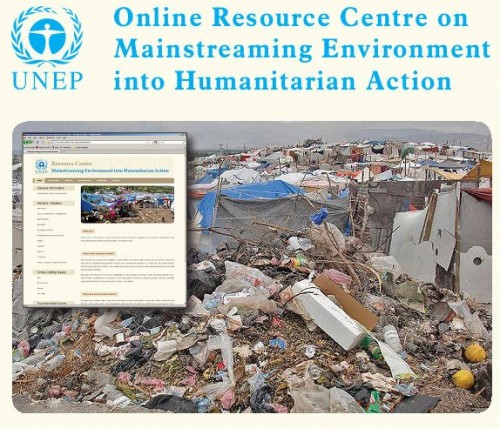Dear Readers,
as much as I would like to share the following link to a very nice training toolkit with you – a toolkit that has been up online for some time now and recently got an extra section on sustainable sanitation – I am seriously wondering what the good folks at UNEP’s Environment, Humanitarian Action and Early Recovery programme are doing all day long. Probably not anything related to knowledge management & IT.
“UNEP and Groupe URD have developed a training toolkit to assist humanitarian actors to integrate environmental considerations into their policy development, planning, programme design and operational activities. The training toolkit consists of 11 modules, with each substantive module containing a summary, PowerPoint presentation, trainer’s guide, training materials and key supporting documents.” (src)
I know it isn’t good style to publicly criticize others, but producing a toolkit that consists of documents saved in DOCX, PPTX or WMV format just isn’t appropriate in any way. This may work for those in charge behind their desks in Europe or the US, but not out there in the field.
Instead, all documents should rather be in Portable Document Format (PDF). Along with a free & light-weight portable PDF viewer. There are quite a few out there with open licences. And the videos – how about AVI instead of Windows (!) Media Video (WMV)? Or Theora? And a portable VLC player for MS Win, OSX and Linux.
How many dev workers in Africa are on Apple computers due to the malware threat? Right.
This publication is just an example. In fact, there are many others – yes, even in 2012 – that are produced in a similar way and which make me think that there’s no real passion behind it. This issue probably wouldn’t arise if everything was accessible via the web – which could also be displayed on small mobile phone screen, instead of 48 MB *.pptx files. Maybe we also have to blame ourselves for producing PDFs that can be shared on- and offline, but whose content would be much better in old-fashioned html.
An example of a passionate project is Alex Weir’s CD3WD collection. That’s much more information than any one of us can handle, yet it’s all usable.
What do you think?


Hi,
Thanks for the fresh perspective.
Can you recommend a site or resource for best practices in terms of IT for the development sector and particularly those based in settings with low bandwidth / unreliable Internet connections?
What open license PDF creators do you recommend?
Thanks for any advice you can provide.
Cheers
Ryan
Hi Ryan,
thx for the feedback. Open PDF viewers I’d recommend are those which are available for all three major platforms. I like the selection on this site: http://portableapps.com/apps because they focus on portable apps. Given that you often can not install apps on a locked-up IT environment for security reasons, a portable app may be a good interim solution (but for Windows only).
PDF Creator: I wouldn’t ship any DVD / info material with such a creator software, but if it had to be one and Windows-only is ok, it would be PDFCreator http://www.pdfforge.org/pdfcreator. But of course, Office 2007 on Win also saves as PDF.
I think a real progress in ICT4D would be the consequent use of laptops with open operating systems.
The reality is that a donor provides a fund, and a local agent then does the purchase of hard- and software, which often results in an HP desktop pc with a UPS and Windows as OS. Now imagine you’re stuck somewhere in Africa in a project where you can’t progress because some malware infected the system. I’ve seen some projects that just didn’t take off due to this problem.
Another software collection I like is the OpenSource DVD
http://www.opensource-dvd.org .
I think in the end it’s less about the right software, but rather the provision of documents in neutral / compatible formats. So you as a reader / receiver won’t have to go to Microsoft.com and download a 48MB plugin to convert DOCX into DOC format.